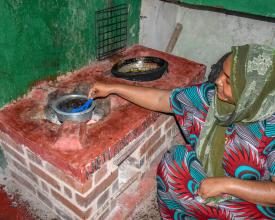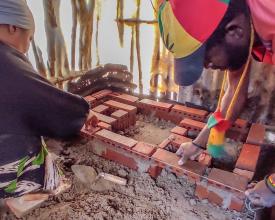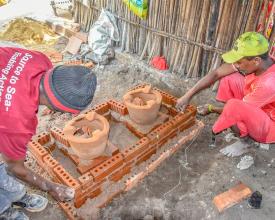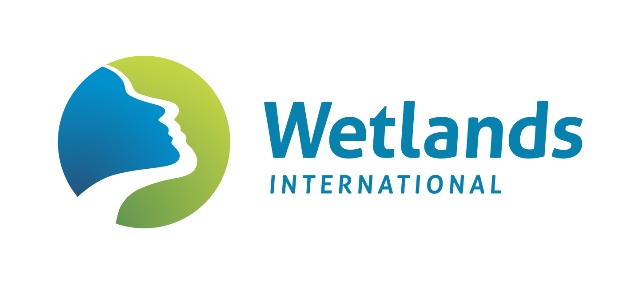
Fuelling Sustainability: Improved Cook Stoves for Sustainable Mangrove Forest Management in Kenya
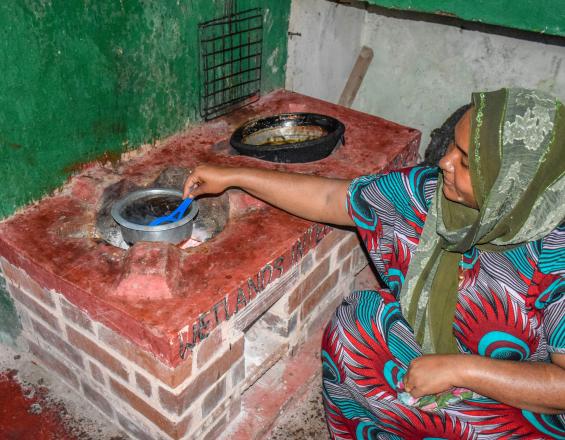
Despite their immense benefits for coastal communities, Kenya's mangroves face increasing pressure from unsustainable fuelwood harvesting. In Lamu County, households rely heavily on mangrove wood for cooking, often using inefficient three-stone stoves that consume excessive amounts of fuel.
To address this challenge, Wetlands International collaborated with local communities and researchers to introduce improved cook stoves (ICS) in Lamu's Matondoni and Pate villages. This community-led initiative has benefited 3,010 community members. By decreasing fuelwood consumption, the ICS reduce pressure on mangroves and contribute to their conservation. This also translates to cost savings for households, as they use less fuelwood, freeing up income for other needs. Additionally, ICS produce less smoke, improving respiratory health and indoor air quality. Furthermore, the initiative has enhanced social cohesion by creating a sense of community ownership and encouraging the sharing of knowledge and experiences on the use of the stoves.
Context
Challenges addressed
Environmental Challenges:
- Kenya's coastal communities rely heavily on mangrove wood for fuel, leading to unsustainable harvesting and deforestation in areas like Lamu County. This loss threatens mangrove functions such as coastal protection, fisheries habitat, and carbon sequestration.
- The prevalent use of traditional three-stone stoves results in inefficient fuelwood consumption, increasing pressure on mangroves and contributing to greenhouse gas emissions.
Social Challenges:
- Traditional cooking methods generate significant smoke (air pollution) leading to respiratory problems, particularly among women and children who spend the most time indoors.
- Collecting fuelwood can be time-consuming, limiting opportunities for education, income generation, and other activities, particularly for women and girls.
- Open fires pose health and safety risks such as burns especially for young children.
Economic Challenges:
- Inefficient stoves require more fuelwood, leading to higher fuel costs and expenses for households.
Location
Process
Summary of the process
The success of this initiative hinges on six interconnected building blocks. It begins with scoping community needs (1) to ensure the intervention is feasible, relevant, impactful. This informs the pilot phase (2) where improved cookstoves are introduced and their use and effectiveness are evaluated before scaling. Community engagement and training (3) are essential for building ownership and ensuring proper use of the stoves, as well as ensuring local communities have the skill set to address any operations and maintenance issues, leading to increased acceptance (4). Positive results from these initial stages pave the way for upscaling and integration (5) of the initiative into local development plans such as the Lamu County Integrated Development Plan and County Climate Change Action Plan, ensuring wider adoption and long-term sustainability. Finally, collaborative action research (6) provides ongoing monitoring and evaluation of the project's impact on both mangrove conservation and human well-being, allowing for adaptive management and continuous improvement. This integrated approach ensures that each element reinforces the others, creating a virtuous cycle that drives positive change for both people and the environment.
Building Blocks
Scoping for community needs-based intervention
A scoping survey was conducted along Kenya’s coast to identify efficient cookstove models, assess their sustainability, and recommend the best options for adoption. This survey provided insights into the need for cookstoves, suitable designs, and market considerations for effective community interventions.
Piloting
In collaboration with local partners, we identified vulnerable areas and conducted a survey in Matondoni village, Lamu, where traditional cookstoves are common. The survey assessed cooking needs and methods while raising awareness about the benefits of ICS for both mangroves and human wellbeing. Two cookstoves were initially set up to gather feedback from end-users over two months on their experiences, benefits, and challenges. Following this pilot, an additional 51 cookstoves were built to inform scaling efforts in other areas of Lamu.
Community Engagement and Training
A skilled technician with wide experience was engaged to design and produce affordable, accessible improved cookstoves. The implementation process involved the community, training eight men and seven women from Matondoni to install and maintain the cookstoves. Additionally, all beneficiaries received basic training on optimal usage and maintenance to ensure long-term sustainability.
Ownership and Acceptance
Cookstove installation was done on a cost-sharing basis, with the community contributing sand and cement. This arrangement fostered a sense of ownership and encouraged better care and maintenance, increasing the cookstoves' durability and cost-effectiveness. Additionally, training community members on installation and maintenance ensured quick access to support, further enhancing ownership and acceptance.
Upscaling and Integration in Development Plan
Following the successful pilot in Matondoni village, there has been high demand and acceptance of the ICS, with neighboring villages and organisations seeking support. As part of the upscaling effort, 41 cookstoves were built in Pate village including Pate Primary School and involved an additional 13 trainees.
Further, the County Government of Lamu partnered with Wetlands International to install 10 cookstoves in five wards on a pilot basis. This initiative aligns with the County's Integrated Development Plan 2023-2027, which highlights the significance of cookstoves in enhancing energy efficiency. A total of 3,010 people continue to benefit from these cookstoves in Lamu.
Action research on impact on mangroves and human well-being
In collaboration with the Kenya Forest Service, Kenya Marine and Fisheries Research Institute, and Kenyatta University, a research study was initiated to quantify the impact of ICS on pollution reduction, health outcomes, and deforestation. The study aims to assess social implications related to health and savings, evaluate the contribution of efficient stoves to mangrove conservation, analyse the role of fuelwood in carbon emissions at both county and national levels, and provide actionable recommendations for short- and mid-term strategies at national and local levels.
Impacts
The introduction of ICS has achieved significant positive impacts across environmental, social, and economic dimensions as described below.
- Social well-being
- Reduced indoor air pollution: ICS are designed to burn fuel more efficiently and have demonstrably improved indoor air quality by reducing smoke emissions. This translates to a reduced incidence of respiratory illnesses, particularly among women and children who spend considerable time near cooking areas.
- Lower risk of burn injuries: The improved design and functionality of ICS have minimised burn risks, particularly for children.
- The community-led approach to implementing the ICS initiative has enhanced collaboration and knowledge sharing, strengthening social bonds within the communities in Matondoni and Pate villages.
2. Environmental
- Reduced deforestation rates: By decreasing fuelwood consumption, ICS contribute to the conservation of mangrove forests. This protects biodiversity and helps maintain the key mangrove ecosystem services.
- Reduced carbon emissions: The increased fuel efficiency of ICS leads to lower greenhouse gas emissions, supporting climate change mitigation efforts.
3. Socio-economic
- Households using ICS report significant cost savings on fuelwood expenses. This frees up income for other essential needs like food and education.
- ICS are more efficient and save time allowing women and children to engage in other productive activities.
Beneficiaries
3,010 people in Lamu, including women, children and youth directly benefit from cleaner cooking with ICS. Trainees gained skills in ICS construction and maintenance, and the wider community benefits from reduced deforestation and improved forest conservation.
Sustainable Development Goals
Story
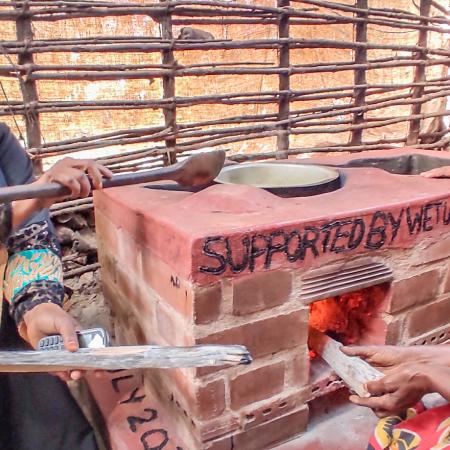
“Ever since I was a little girl growing up in Matondoni, I’ve cooked on a traditional three-stone stove. Living with my daughters and their families, we rely on local suppliers for our fuelwood. They venture out on boats to gather dead wood from the mangrove areas. A bundle costs about 100 Kenya Shillings (just under a dollar) and typically lasts for three to four meals, depending on what I’m cooking.
I remember making frequent trips to the hospital, sometimes weekly, battling eye and respiratory issues. But everything changed with the new improved cookstove which was built for us in 2022. It’s almost smoke-free, which has made a world of difference for my health, and it’s cut our cooking time significantly.
With the old stove, I’d spend up to four hours preparing just one meal. Now, I can whip up the same dish in half that time. Plus, the cost of fuelwood has dropped since we only need to use two pieces at a time. The new stove retains heat beautifully and is so much more efficient—it’s been a real game changer for our family and many households in Lamu.” – Sofia Shee, 52, resident of Matondoni village.

